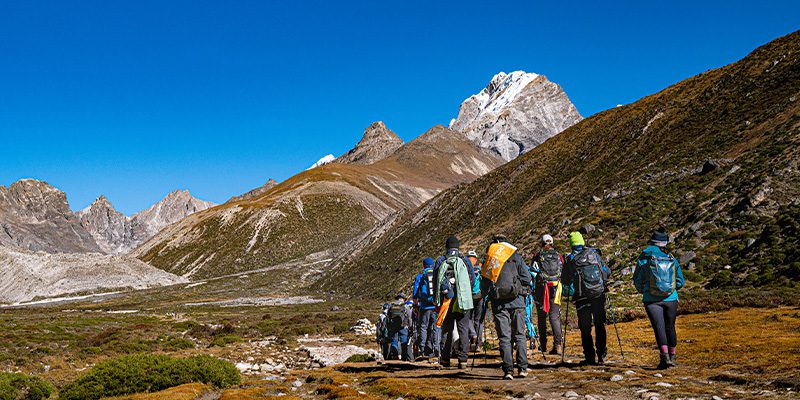
The right guide for your Everest Base Camp trek can make the difference between the experience of a lifetime and walking yourself to exhaustion. With altitudes, weather, and trail conditions that can change in an instant, the Everest region calls for more than personal preparation: it calls for local know-how you can count on. A proper trekking guide not only guarantees personal safety but also enhances your trek with local knowledge, logistics, and some handy motivation when you are running low on gas during the hike.
Begin your search in Kathmandu or through registered internet-based organisations operating from Nepal. Search for a government-licensed guide who works with well-regarded trekking agencies, registered with the Nepal Tourism Board (NTB) and the Trekking Agencies’ Association of Nepal (TAAN). These certificates are important, as they let people know you have been professionally trained in first aid, altitude awareness, and rescue protocol. An experienced guide can detect the onset of altitude sickness early on and help you make important decisions, such as when to rest, when to drink water, and when to descend.
You can also read online reviews on sites like TripAdvisor, Google Reviews, or travel forums to vet the reputation and communication abilities of potential guides. Consistently positive feedback on their professionalism, English proficiency, local knowledge, and helpfulness is a good place to start. It can be safer, especially for rookies, to book through a licensed trekking agency than to pick up someone off the street.
Another approach to selecting the best Everest Base Camp guide is by seeking recommendations from other trekkers or travel communities. Word-of-mouth references are really gold, they are based on previous experiences of people who have made the same journey we are still doing. Feel free to ask the guide or the company about their experience on the EBC trail, not just in general trekking in Nepal. A seasoned Everest Base Camp guide should know the ins and outs of the route, from the best methods of acclimatization to the location of safe drinking water and reliable teahouses.
Of course, price is a factor, but the lowest price point should not always be the decider. A good guide will charge you $25 to $35 a day, and it’s well worth it for their safety and experience. Many also employ porters, and some have guide-porter options, which are cheaper but still provide the necessary assistance. If you just want a fully organized event, you can book a package trek that will take care of your permits, guide, Mochu or Kumchhu accommodations, and round-trip domestic flights. But be clear on what’s included in the price, and what isn’t.
Clear communication is vital. Contact the guide over the phone or video call for that extra flavour of personality and clarity before going ahead with your booking. A helpful guide will take the time to hear your questions and express sincere interest in your objectives and issues.
And, most importantly, the best guide to your base camp trek is one who is experienced, certified, reliable, and friendly. They are your friend in the Himalayas, ensuring that you’re not only going to make it to Everest base camp safely, but also be able to savor every moment along the way. Pick right, and your Everest Base Camp trek will be a once-in-a-lifetime adventure.
Why Go For A Guide For Everest Base Camp Trek?
It is very important to hire a guide in Everest Base Camp (EBC) for both safety and to get more out of your trek. The track is arduous, with high altitude conditions and altitude sickness, and erratic weather that will threaten even the most experienced trekker. A professional guide gauges your health, recommends how to acclimatize, and gets you out of trouble.
Guides can also provide local knowledge on Sherpa life, customs, and less trodden gems along the trek, providing a deeper cultural touch for the experience. They take care of the logistics like permits, booking for accommodations, and transportation arrangements that might be too much for the DIY trekker. This allows you to stay in the moment and enjoy the journey.
And most importantly, you’ll have someone who can talk with the locals, haggle for a fair price, and help with any emergencies, including organizing evacuations if needed. A better tour if yougoing into it as a first-time trekker or aren’t familiar with Nepal is to hire a guide to take away some of the anxiety and keep you safe.
Professional, first-aid-trained, and familiar with high-altitude trekking rules, government-registered guides. Yes, hiring a guide pushes your budget, up it’s worth spending to secure your health, safety, and improve the overall Nepalese experience of trekking to Everest Base Camp.
Where to Find a Certified Everest Base Camp Guide?
The process to obtain a licensed Everest Base Camp guide begins with the search for the ones registered in the Nepal Tourism Board (NTB) and the Trekking Agencies’ Association of Nepal (TAAN). These certifications attest that the guide has received basic instruction in safety, altitude sickness, and rescue.
A guide can be found through trustworthy trekking companies from Kathmandu or online portals that arrange trekking tours in Nepal. This is just as certain with doctors specializing in varicose vein surgery, as here you are free to access doctor profiles, qualifications, and even customer reviews to help you make an informed decision.
Look always for a guide who knows English very well and has good experience in their previous days for the EBC trail. Previous client reviews on websites such as TripAdvisor, Lonely Planet, or travel review sites are useful for confirming professionalism and English-speaking skills.
You should email or speak directly with any potential tour guides before committing, inquiring about their certifications, trekking history, and emergency protocols. An agency booking lowers your risk, but if you hire independently, always check qualifications to be sure you are safe and secure on your trek.
What are 5 questions to ask before hiring an EBC Guide?
Before you hire your Everest Base Camp guide, be sure to ask some specific, important questions to guarantee you get a professional and compatible guide. Begin by verifying their license and experience on the EBC route — ask them how many tracks they have taken through this route and how many of those reached the destination, whether there were any emergency cases, and how they handled them.
Inquire about their language abilities, particularly their proficiency in English — effective communication is vital. Ask whether they are certified in first aid and altitude illness. Learning how they acclimate and set their pace will help you measure if the way they prepare is in line with your fitness and comfort.
Ask what is included in the fee that they charge – do they organize permits, lodgings, food, and porters? Check their policies and procedures regarding unforeseen delays, weather, and any health issues.
Talk over their cultural savvy, or simply, if they have a desire to tell you interesting stories about the local villages and traditions. Lastly, discuss tipping guidelines, cancellation policies , and payment methods to prevent any surprises.
By asking these questions right up front, you can create a level of trust, clearly define expectations, and make sure your guide can support this in order to provide a safe and successful trip for a lifetime of Everest Base Camp memories.
How Much Does It Cost to Hire a Guide for Everest Base Camp?
The average price of an Everest Base Camp Tour will be around $ 25- USD 35 per day, with the normal trekking season, the guide’s experience, and the agency you do your booking with being determining factors. You should expect to pay about $300 to $USD 500 for a typical 12-14 day trek.
This fee generally includes the guide’s wage, government licensing, and insurance. (These prices will usually not cover the cost of permits, domestic flights, food, lodging, or porter fees, which are billed separately or included in package deals.
Some trekkers also employ a guide-porter combo, which can be more affordable but is generally not recommended for managing safety and pace on the trail. Porters charge between $15 and USD 25 per day.
Although hiring a guide increases your trekking cost, the plus side is the safety, local wisdom, and logistics that are hard to come by in this demanding trekking region of Everest.
And remember to budget at least an extra 10-15% to cover the standard recommended tipping for guides and porters.
Can You Get a Guide for Everest Base Camp at the Last Minute?
It is also possible to search for a guide for Everest Base Camp at the last minute when the demand is low (off-season). But in high trekking seasons — spring (March to May) and autumn (September to November) — guides and permits are quickly snapped up, and hiring last minute becomes more challenging and expensive.
If you arrive in Kathmandu with no set plans, you’re always able to pop into trekking agencies and find guides that are available, although your choices may be limited in the high season. Last-minute bookings also slash precious time for important preparation, such as permits and gear rental.
It’s probably safer to book at least a few weeks in advance so your guide is properly licensed and permits and flights are locked in.
If you do need to book last-minute, expect to pay a premium, and expect there to be fewer options for experienced guides. Then, make sure your guide is properly certified and speaks a language you are comfortable with, and you will have no problems during your Trek.
What Does an Everest Base Camp Guide Do?
An Everest Base Camp Hike guide is essential for a safe, smooth, and fun trek. Their main job is to take care of you on treks. This involves keeping an eye on symptoms of altitude sickness, pacing your itinerary, and making recommendations on hydrating and resting.
Guides also have to know their way around the trail, which can be difficult because it is rough and tough, through changing weather. These arrangements will include daily lodging arrangements, meal coordination, and permits, so that you don’t need to spend extra time or feel stressed due to these issues.
Cultural mediation is an additional key task. Guides will also lead you through Sherpa traditions, religious havens, and customs, which will lend depth to your knowledge about the region’s heritage.
Guides serve as first responders in the event of an emergency, rendering first aid and leading evacuations, as necessary. They communicate with your porters and other trek staff to organize your gear.
Finally, a good guide will keep in touch with you, answer questions, motivate you when the going gets tough, and just generally be someone you can trust. When present, they can turn a hard slog into the most memorable time of your life.
Should You Choose a Guide or A Porter for Everest Base Camp?
Whether you choose to hire a guide or a porter will depend on what you’re looking for, how much you’re willing to spend, and your trekking experience. A guide is invaluable for first-time trekkers or for those with no experience of trekking at high altitude, with knowledge of navigation, safety, health, and culture.
A coolie, on the other hand, carries your heavy luggage – usually around 15-20 kg – sparing you from any burden when you are hiking. Porters give no route or health advice, but they remove a huge amount of physical discomfort.
If you have the budget, the best arrangement is to hire both a guide and a porter: the guide will get you, and the porter will ensure that the bags get where they need to go. Some trampers go for a guide-porter combination, although it can be a bit intense for one person to hold both roles.
For solo and experienced trekkers who are sure that the right routes are taken for the trek, they can hire a porter only. But guides offer crucial support for safety and cultural learning.
It all depends on your fitness, experience, and budget. There are a lot of trekking agencies that offer packages for guides and porters according to your choice.
Is it possible to trek to Everest Base Camp independently, without a guide?
Everest Base Camp Trek Itinerary Yes, you can hike to Everest base camp without a guide, and more and more independent travelers do it due to freedom and budget management. Trekking without professional assistance, solo or in a group of friends. The slope requires serious preparation and awareness.
The EBC has defined trails and has had many people trekking it, so you assume that will make it easy. In Kathmandu, it is possible to obtain permits, and there are teahouses for lodging along the way.
You’ll have to mitigate altitude sickness risks by pacing the trek properly and knowing the signs, without the aid of a guide. You’ll also coordinate logistics, like arranging accommodations at teahouses or transportation, and communicating with locals who may not understand English.
While solo trekking would be cheaper — you’re not paying for a guide — it does come with increased risk in the event of emergencies. Without a guide, evacuation and medical assistance could be difficult.
Trekking alone is possible if you are used to high and cold altitudes and confident with your backcountry skills. Otherwise, it is highly recommended to hire a guide for safety and to enhance cultural understanding.
How Do You Know Your Everest Base Camp Guide Is Certified?
It is extremely important to check the credentials of your EBC guide for a safe and reliable trekking experience. Begin by asking for their Nepal government trekking guide license card, which is provided by the Nepal Tourism Board (NTB). This is a formal recognition that the guide is trained in first aid, rescue, and high-altitude trekking.
And finally, see if the guide is TAAN registered and associated with a reputed trekking agency. Training and support for guides are provided by agencies, and the service is improved.
# Ask for references and/or reviews from previous trekkers who have used the guide. Honest reviews abound in many places, such as on TripAdvisor, Lonely Planet forums, or Facebook trekking groups.
If booking online, book through reputable trekking agencies that have clear policies and verified guide profiles. No to hiring ones that are not licensed or cannot offer the evidence.
And lastly, listen to your gut when you do your first exchanges. A guide should be clear with answers to your questions, appear on time, and come across with confidence and knowledge of the Everest region.
What Should My Everest Base Camp Guide Know about Culture?
The perfect Everest Base Camp Trek package guide should have an extensive cultural insight about the Khumbu region to not only help you face physical challenges but also make sure that you excel along the whole EBC trek. This includes taking into account Sherpa customs, religious practices, and village celebrations.
Guides often teach trekkers the meaning behind Buddhist monasteries, prayer flags, mani stones, and chortens they encounter along the trail. They will be Kind enough to acquaint you with the Sherpa culture, dress, way of living, and the food as well.
Speakers of local languages such as Sherpa or Nepali can help guides communicate with villagers, porters, rs, and monastery caretakers, making for smoother interaction and cultural exchange.
They can also teach you about the history of mountaineering, the history of climbing on Everest, famous climbing stories, and mountaineering ethics, as well as ongoing conservation work in the region.
This is the sort of walk that you’d like to share with a local teacher who will tell you about the people and spirit of the Himalayas, not just the mountains.
Should I Hire a Guide During the Everest Base Camp Trek?
Although it is possible to hike to Everest Base Camp (EBC) on your own, it is strongly advisable to hire a guide, especially for novice trekkers or for those with no previous experience with hiking in high altitudes. The trek to EBC takes considerable planning and logistics, permits, rugged landscapes, and the risks of altitude sickness to consider. Guidance of a professional guarantees you a safe trip as he takes care of your health, acclimatization, and assists in case of an emergency.
EBC Trekking Guides are also wonderful cultural liaisons, immersing you in Sherpa customs, local villages, and Buddhist monasteries as you journey. They manage accommodations, haggle for prices, and can talk with locals to make your life easier and your experience even better.
Independent trekking can be done by experienced trekkers who know the area well and have a knowledge of health care and navigation. Last but not least, a guide is valuable for your EBC trek by ensuring safety, offering expertise, and making your Everest Base Camp trek more enjoyable and rewarding.
How Much Does a Guide for Everest Base Camp Cost?
Going with a guide Everest Base Camp guide will cost $25-35 USD a day. For the typical 12- 14-day trek, that’s around $300-$500 (US). This fee typically pays the guide’s wage as well he their government licensing and insurance, while usually it does not cover other expenses such as permits, accommodation, food, and porter fees.
Many trekkers also employ porters to heft heavy bags, adding $15 to USD 25 a day. (If anything, a guide-porter combo, in which one person does both jobs, is even worse, from a safety and pace-control perspective.)
A guide may seem an unnecessary added expense, but the security and experience they offer is not just of financial value but also a cultural one. It’s also important to allot for tipping your guide and porter (usually about 10-15% of their total fees is appropriate to tip in Nepal).
How Do I Prepare for Everest Base Camp?
Acutely planning for Everest Base Camp is necessary for a safe and pleasant trek. I started by narrowing down the best time to visit, either during the spring (March to May) or the fall (September to November), when the weather was the most comfortable.
Obtaining required permits early on, such as your Sagarmatha National Park permit and your Khumbu Pasang Lhamu rural municipality permit. It is very important to book your Kathmandu to Lukla flight in advance, as seats are sold out quickly during the peak season.
A certain degree of physical readiness is required. Start training a few months in advance of your trek with an emphasis on cardio conditioning, strength training, and hiking with a weighted pack.
You need to decide if you want to hire a guide and/or porter, depending on your trekking experience and budget. Take out insurance that covers high-altitude trekking and emergency evacuation.
You want to pack a few basics like good hiking boots, layered clothing, sleeping bags, and trekking poles. Research your itinerary, acclimatization plan, and accommodation to establish realistic daily distances and help prevent AMS.
How Fit Do I Need to Be for Everest Base Camp?
Mount Everest Base Camp Tour Fitness: A moderate to high fitness level is required to trek to Everest Base Camp. The hike is a grueling 5 to 8 hours a day over bumpy, steep trails at high altitudes, including oxygen levels reaching 52 percent of those found at sea level. Strong cardiovascular fitness increases your endurance and decreases fatigue on extended trekking days.
Before your trek, perform aerobic workouts such as running, cycling, or swimming at least 3-4 times a week for a few months. You need strong trunk and back muscles to increase your endurance in a backpack.
Practicing hiking on uneven ground and increasing your distance carrying weight on your back will help you get used to the trail.
So is mental fitness. The climb requires that you are not only in good physical shape and ascend slowly to get used to the altitude, but also will power and a good attitude to deal with the altitude and physical hardship.
It’s not necessary to be an extreme athlete in order to hike the trail, but it can be damaging to your health and diminish the fun of your trip if you underestimate the physical demands of the trek. View your doctor’s qualifying trip if you have any health issues.







